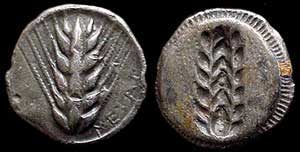Agriculture in ancient Greece
Agriculture in Ancient Greece played a crucial role in the economic, social, and cultural life of the Hellenic civilization. The geography of Greece is characterized by a mountainous peninsula and numerous islands, leading to fragmented land that was challenging for large-scale agriculture. However, the ancient Greeks innovated and adapted to their environment, developing a system of agriculture that supported their society and influenced the Western world.
Geography and Climate[edit | edit source]
The geography of Greece is predominantly mountainous, which significantly influenced the types of crops that could be grown. The climate varies from Mediterranean along the coastlines to more temperate zones in the north and in mountainous areas. These conditions were conducive to growing a variety of crops, including olives, grapes, and cereals such as barley and wheat.
Crops and Livestock[edit | edit source]
Olive oil and wine were among the most important agricultural products in ancient Greece, vital for domestic consumption and trade. Olives and grapes were well-suited to the Greek climate and soil, and they became staples of the Greek diet and economy. Cereals were also crucial, with barley being the primary grain for making bread and porridge. Wheat was grown but was less common due to its higher demand for fertile land.
In addition to crop farming, livestock was an essential part of Greek agriculture. Sheep and goats were the most common livestock, providing milk, cheese, wool, and meat. Cattle were less common due to the limited grazing land and were mainly used for ploughing and as draft animals. Beekeeping for honey and the cultivation of vegetables and fruits were also integral to the agricultural practices of ancient Greece.
Agricultural Practices[edit | edit source]
The ancient Greeks employed various agricultural practices to maximize the use of their land. Crop rotation and the use of manure for fertilization were common practices. The Greeks also developed terracing techniques to farm on hilly terrain, effectively preventing soil erosion and increasing arable land area.
Irrigation was used, but its application was limited due to the topography and the availability of water sources. The Greeks relied on rain-fed agriculture for the most part, which made them vulnerable to periods of drought.
Social and Economic Impact[edit | edit source]
Agriculture was the backbone of the economy in ancient Greece, with most of the population engaged in farming. Land ownership was a significant indicator of wealth and social status. The polis (city-state) system in Greece, with its emphasis on communal values and responsibilities, included the distribution of land to citizens.
Trade in agricultural products, especially olive oil and wine, was a major part of the Greek economy and contributed to the development of trade networks throughout the Mediterranean. These products were not only essential for domestic consumption but also served as valuable commodities for exchange.
Religious and Cultural Aspects[edit | edit source]
Agriculture also had deep religious and cultural significance in ancient Greece. Many festivals and rituals were associated with the sowing and harvesting of crops, reflecting the importance of agriculture to the Greek way of life. Deities such as Demeter, the goddess of the harvest, and Dionysus, the god of wine, were central to Greek mythology and worship, underscoring the spiritual connection between the people and their agricultural practices.
Conclusion[edit | edit source]
Agriculture in ancient Greece was a fundamental aspect of Greek society, shaping its economy, social structure, and culture. Despite the geographical and climatic challenges, the ancient Greeks developed an agricultural system that not only sustained their civilization but also contributed to the legacy of agricultural innovation in the Western world.
Navigation: Wellness - Encyclopedia - Health topics - Disease Index - Drugs - World Directory - Gray's Anatomy - Keto diet - Recipes
Search WikiMD
Ad.Tired of being Overweight? Try W8MD's physician weight loss program.
Semaglutide (Ozempic / Wegovy and Tirzepatide (Mounjaro / Zepbound) available.
Advertise on WikiMD
WikiMD is not a substitute for professional medical advice. See full disclaimer.
Credits:Most images are courtesy of Wikimedia commons, and templates Wikipedia, licensed under CC BY SA or similar.Contributors: Prab R. Tumpati, MD





